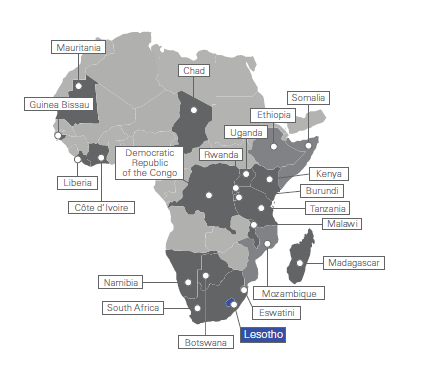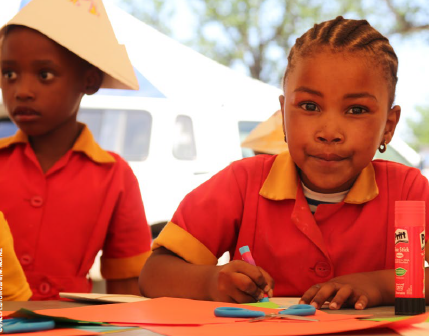Lesotho is a small country, landlocked by South Africa.
The challenges
Lesotho has made solid progress towards strengthening access to education over the last two decades with introduction of free primary education in 2000 and free and compulsory primary education in 2010. But while opportunities are clear, there are also challenges, many of which are common to sub-Saharan Africa, but significant to Lesotho:
• Primary school retention rates low – only 70 per cent of students who enter primary school complete the last grade. The primary education completion rates of boys and rural children are particularly low at 66 per cent and 59 per cent, respectively;
• Investment is lacking – particularly in curriculum development, teacher training and learning materials, including digital tools. The result is low-quality education;
• Weak monitoring and quality assurance systems – these systems need strengthening to improve teaching and learning practices and to ensure all children are included in and benefit from education;
• Schools are not inclusive – children with disabilities have few options to access learning opportunities;
• High rates of poverty – estimates in 2017 suggest that over half the population still lives under the US$1.90 a day poverty line. This affects children trapped in poverty, who in turn suffer poor health, lack of education, lack of income, inadequate living
Our response in Lesotho
Our partner organisation UNICEF has been in Lesotho since 1967, serving as the national advocate for children and a trusted government partner for more than 50 years. Together with UNICEF we succeded in significantly improved the school enrolment rate – it is near universal at the primary level and has nearly doubled in early education – and have resulted in important policies that facilitate inclusive learning environments for all children. We work with various government ministries helped to build a sector-wide approach to education. One example is the 2013 National Policy for Integrated Early Childhood Care and Development, which successfully enumerates the comprehensive services including education, protection, health and nutrition, and
stronger cross-sector coordination, all of which must be administered in early childhood. The Peter Krämer Foundation also provides early childhood educators with comprehensive training before they enter classrooms and after they have begun
teaching. Creating a specific diploma in Early Childhood Development has also helped convey the importance of this field. Education quality in the older grades remains a priority. In addition to co-leading development of the Education Sector Plan for 2016–2026, UNICEF is supporting the government to roll out new primary and secondary curricula – emphasizing 21st-century skills – to improve foundational numeracy and literacy skills as well as transferable skills (creativity, problem solving and critical thinking) and enhancing learner-centred teaching methods. In partnership with the Ministry of Education, we are developing and implementing child-friendly school standards in all primary schools, which actively engage communities and promote safe and protective school environments. UNICEF also provides technical assistance to strengthen education management information systems. This involves moving from paperbased reporting to digitization using an innovative opensourced system that will allow real-time monitoring to follow individual learners, schools and districts. Finally, the Peter Krämer Foundation and UNICEF have worked with the government to introduce an inclusive and non-formal education policy to improve the availability and quality of alternative education pathways for out-of-school children and to provide access to and quality of education for children with disabilities.


